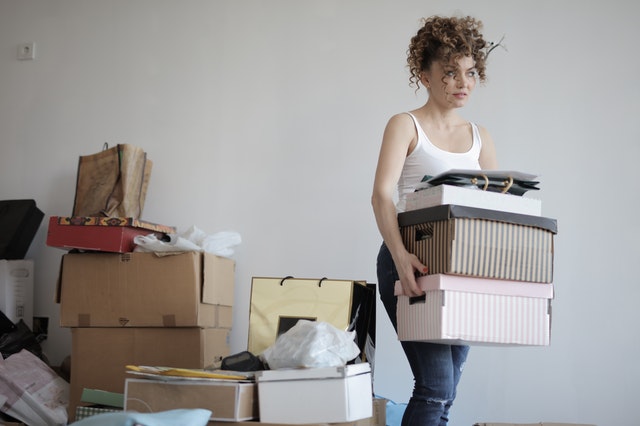
Let’s be honest – people who genuinely enjoy a time-consuming task such as decluttering are scarce. Most people tend to delay it for as long as they can. Sometimes, even up to the point where they can’t imagine handling this without reaching out to professionals to declutter and organize their belongings. Even after this task is completed, there is the question of how to get rid of your clutter responsibly. But don’t worry – we’re here to help you fall in love with decluttering and realize its benefits. We’ll let you in on simple decluttering tips before revealing ways to get rid of everything you no longer need.
Tips to help you get rid of clutter
Decluttering your home is essential not only for aesthetical reasons. For instance, a study published by Current Psychology found a connection between procrastination and clutter. Keep in mind that this is just one of many studies that back up the claim that clutter can negatively impact mental well-being.

Did you know that clutter can make us feel stressed, anxious, and even depressed?
So whether you are a senior looking to downsize after retirement or you feel like clutter is taking over the space in your home, it’s important to find motivation and get to work as quickly as possible. Below, we’ve prepared two tips to help you with precisely that.
Declutter like you’re about to move
If lack of motivation stops you from starting to declutter, an excellent way to boost yourself is to imagine you’re moving. Only when moving, you’d have to contact professionals to pack and unpack everything while this time, you’re spared of this part.
So make sure to set a decluttering deadline, aka your “moving date,” and make it a point to finish decluttering by then. It won’t be easy, especially when the time comes for decluttering sentimental items. However, as soon as you’re finished, you’ll start wondering why you haven’t done it ages ago.
Declutter room by room
The best way to declutter is to go room by room. It’s always best to start with the most-high traffic area in your home (most likely your kitchen or living room). Then start going through your belongings and sorting them into piles depending on what you want to do with them.
If you prioritize your most-used rooms first, you’ll instantly feel the positive effect of decluttering and organizing. This will give you the motivation and inspiration you need to continue purging other rooms in your home. Keep in mind that you should be thorough and check every item in detail before deciding what to do with it. Also, don’t skip areas thinking you’ll come back to them later – you won’t.

The golden rule of decluttering is to go through your stuff and sort them into three piles: keep, toss, and donate/gift/sell.
For example, let’s say you are decluttering your bathroom before packing for a move. When decluttering a room like this, it is important to pay attention to details and check every item. We guarantee you’ll find many that are either forgotten about or even expired. Remember, your end goal is to reduce the number of items, as that will help when packing your bathroom for the move. At least, it will help not bring more junk with you to your home.
Ways to responsibly get rid of your clutter
Now that you know what the easiest ways to purge your home of junk are, you might wonder what to do with all of those excess belongings. Even if you had estate clearing services do all the work for you, you still need to figure out what to do next. So further in this article, you’ll find different options for responsibly getting rid of your clutter.
Reach out to your local waste management company
If you do a quick google search, you’ll quickly find information about what can be recycled in your community. It shouldn’t be challenging to find out how and when you can recycle your stuff. Make sure to at least get in touch with a local waste management company, as they might give you valuable info on other local resources where you can get rid of your clutter.
Get rid of your clutter by donating it
A great way to get rid of things that are in good condition but you no longer want to use them is to donate them. However, don’t get too caught up in trying to find the proper organization. Any organization you choose is the right one, and you’ll be doing a good deed no matter which one you pick.
The best way to go about this is to choose organizations that make donating items easy. You’ll probably be able to come up with a couple of places where you can donate your belongings locally. Donating is definitely the best way to get rid of your unnecessary items.
Give things to your friends
Before you start donating things, it would be good to reach out to your friends. If you made sure to create a home inventory while decluttering, you could easily let them know what items you no longer want. Perhaps some of them could use your old blender or even some good clothing pieces that you no longer wish to wear.
Sell your stuff
A great way to get rid of your excess belongings and make some money simultaneously is to sell your stuff. Nowadays, the easiest way is to sell your things online, so here are some ideas for you:
- One of the best places to sell your things is Amazon, as it’s effortless and straightforward to use. Search for any item you’d like to sell. Then look for a little button on the right-hand side of the screen that says “Sell on Amazon,” which means that the item is in demand. If you don’t see the button, it’s better to skip selling this item here.
- If you are looking for a place to sell your old clothes quickly, check out ThredUp. Before sending anything, make sure to read their accepted list. In case they don’t accept some of the items you’ve sent, they’ll donate them for you, or you can pay to have them sent back.
- In case you want to sell your decluttered books, check out SellBackBooks. It’s truly a quick and straightforward way to earn extra money.
Organize a garage sale
Once you declutter and make the most of your garage space, why not organize a garage sale and quickly remove all of your “junk”? Simply price your items and try to sell them. If you have anything remaining, you can donate it. Plus, organizing a garage sale is a good motivation for keeping your home clutter-free in the future.

Organizing a garage sale is a great way to get rid of your clutter and earn some extra cash.
Final thoughts
We hope our article helped you declutter efficiently and find responsible ways to get rid of your clutter. Even though it might be time-consuming and tiring, as soon as you enter your cleared and neat home, you’ll know your efforts were worth the trouble. We guarantee you’ll feel motivated to continue in the same direction and implement decluttering habits into your everyday life. But if you want to experience the best results, make sure to get in touch with professionals. Their organizing and decluttering skills will leave you in awe!
We can help


